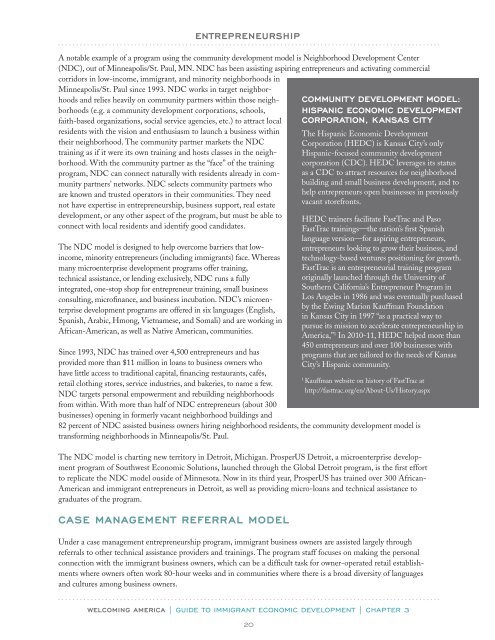IMMIGRANT
npjjbma
npjjbma
- No tags were found...
Create successful ePaper yourself
Turn your PDF publications into a flip-book with our unique Google optimized e-Paper software.
ENTREPRENEURSHIPA notable example of a program using the community development model is Neighborhood Development Center(NDC), out of Minneapolis/St. Paul, MN. NDC has been assisting aspiring entrepreneurs and activating commercialcorridors in low-income, immigrant, and minority neighborhoods inMinneapolis/St. Paul since 1993. NDC works in target neighborhoodsand relies heavily on community partners within those neighborhoods(e.g. a community development corporations, schools,faith-based organizations, social service agencies, etc.) to attract localresidents with the vision and enthusiasm to launch a business withintheir neighborhood. The community partner markets the NDCtraining as if it were its own training and hosts classes in the neighborhood.With the community partner as the “face” of the trainingprogram, NDC can connect naturally with residents already in communitypartners’ networks. NDC selects community partners whoare known and trusted operators in their communities. They neednot have expertise in entrepreneurship, business support, real estatedevelopment, or any other aspect of the program, but must be able toconnect with local residents and identify good candidates.The NDC model is designed to help overcome barriers that lowincome,minority entrepreneurs (including immigrants) face. Whereasmany microenterprise development programs offer training,technical assistance, or lending exclusively, NDC runs a fullyintegrated, one-stop shop for entrepreneur training, small businessconsulting, microfinance, and business incubation. NDC’s microenterprisedevelopment programs are offered in six languages (English,Spanish, Arabic, Hmong, Vietnamese, and Somali) and are working inAfrican-American, as well as Native American, communities.Since 1993, NDC has trained over 4,500 entrepreneurs and hasprovided more than $11 million in loans to business owners whohave little access to traditional capital, financing restaurants, cafés,retail clothing stores, service industries, and bakeries, to name a few.NDC targets personal empowerment and rebuilding neighborhoodsfrom within. With more than half of NDC entrepreneurs (about 300businesses) opening in formerly vacant neighborhood buildings andCommunit y Development Model:Hispanic Economic DevelopmentCorporation, Kansas Cit yThe Hispanic Economic DevelopmentCorporation (HEDC) is Kansas City’s onlyHispanic-focused community developmentcorporation (CDC). HEDC leverages its statusas a CDC to attract resources for neighborhoodbuilding and small business development, and tohelp entrepreneurs open businesses in previouslyvacant storefronts.HEDC trainers facilitate FastTrac and PasoFastTrac trainings—the nation’s first Spanishlanguage version—for aspiring entrepreneurs,entrepreneurs looking to grow their business, andtechnology-based ventures positioning for growth.FastTrac is an entrepreneurial training programoriginally launched through the University ofSouthern California’s Entrepreneur Program inLos Angeles in 1986 and was eventually purchasedby the Ewing Marion Kauffman Foundationin Kansas City in 1997 “as a practical way topursue its mission to accelerate entrepreneurship inAmerica,” 1 In 2010-11, HEDC helped more than450 entrepreneurs and over 100 businesses withprograms that are tailored to the needs of KansasCity’s Hispanic community.1Kauffman website on history of FastTrac athttp://fasttrac.org/en/About-Us/History.aspx82 percent of NDC assisted business owners hiring neighborhood residents, the community development model istransforming neighborhoods in Minneapolis/St. Paul.The NDC model is charting new territory in Detroit, Michigan. ProsperUS Detroit, a microenterprise developmentprogram of Southwest Economic Solutions, launched through the Global Detroit program, is the first effortto replicate the NDC model ouside of Minnesota. Now in its third year, ProsperUS has trained over 300 African-American and immigrant entrepreneurs in Detroit, as well as providing micro-loans and technical assistance tograduates of the program.Case Management Referral ModelUnder a case management entrepreneurship program, immigrant business owners are assisted largely throughreferrals to other technical assistance providers and trainings. The program staff focuses on making the personalconnection with the immigrant business owners, which can be a difficult task for owner-operated retail establishmentswhere owners often work 80-hour weeks and in communities where there is a broad diversity of languagesand cultures among business owners.WELCOMING AMERICA | GUIDE TO <strong>IMMIGRANT</strong> ECONOMIC DEVELOPMENT | CHAPTER 3.20


